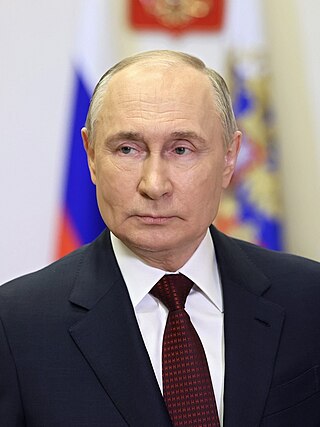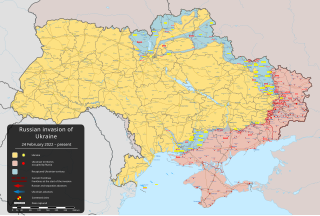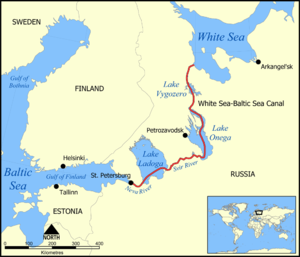
Russia, or the Russian Federation, is a country spanning Eastern Europe and North Asia. It is the largest country in the world by area, extending across eleven time zones and sharing land borders with fourteen countries. It is the world's ninth-most populous country and Europe's most populous country. The country's capital as well as its largest city is Moscow. Saint Petersburg is Russia's second-largest city and cultural capital. Other major cities in the country include Novosibirsk, Yekaterinburg, Nizhny Novgorod, Chelyabinsk, Krasnoyarsk, Kazan, Krasnodar and Rostov-on-Don.

Russian is an East Slavic language, spoken primarily in Russia. It is the native language of the Russians and belongs to the Indo-European language family. It is one of four living East Slavic languages, and is also a part of the larger Balto-Slavic languages. It was the de facto and de jure official language of the former Soviet Union. Russian has remained an official language in independent Russia, Belarus, Kazakhstan, Kyrgyzstan, and Tajikistan, and is still commonly used as a lingua franca in Ukraine, Moldova, the Caucasus, Central Asia, and to a lesser extent in the Baltic states and Israel.

Vladimir Vladimirovich Putin is a Russian politician and former intelligence officer who is the president of Russia. Putin has held continuous positions as president or prime minister since 1999: as prime minister from 1999 to 2000 and from 2008 to 2012, and as president from 2000 to 2008 and since 2012. He is the longest-serving Russian or Soviet leader since Joseph Stalin.

The Russian Far East is a region in Northeast Asia. It is the easternmost part of Russia and the Asian continent; and is administered as a part of the Far Eastern Federal District, which is located between Lake Baikal in eastern Siberia and the Pacific Ocean. The area's largest city is Khabarovsk, followed by Vladivostok. The region shares land borders with the countries of Mongolia, China, and North Korea to its south, as well as maritime boundaries with Japan to its southeast, and with the United States along the Bering Strait to its northeast.

The federal subjects of Russia, also referred to as the subjects of the Russian Federation or simply as the subjects of the federation, are the constituent entities of Russia, its top-level political divisions according to the Constitution of Russia. Kaliningrad Oblast is the only federal subject geographically separated from the rest of the Russian Federation by other countries.
Russian oligarchs are business oligarchs of the former Soviet republics who rapidly accumulated wealth in the 1990s via the Russian privatisation that followed the dissolution of the Soviet Union. The failing Soviet state left the ownership of state assets contested, which allowed for informal deals with former USSR officials as a means to acquire state property.

This is a list of international, national and subnational flags used in Europe.

The government of Russia is the federal executive body of state power of the Russian Federation. The members of the government are the prime minister, the deputy prime ministers, and the federal ministers. It has its legal basis in the Constitution of the Russian Federation and the federal constitutional law "On the Government of the Russian Federation". The Apparatus of the Government of Russia is a governmental body which administrates the activities of the government.

Saint Petersburg, formerly known as Petrograd and later Leningrad, is the second-largest city in Russia after Moscow. It is situated on the River Neva, at the head of the Gulf of Finland on the Baltic Sea. The city had a population of roughly 5.6 million residents as of 2021, with more than 6.4 million people living in the metropolitan area. Saint Petersburg is the fourth-most populous city in Europe, the most populous city on the Baltic Sea, and the world's northernmost city of more than 1 million residents. As Russia's Imperial capital, and a historically strategic port, it is governed as a federal city.

The Russo-Ukrainian War is an ongoing war between Russia and Ukraine, which began in February 2014. Following Ukraine's Revolution of Dignity, Russia occupied and annexed Crimea from Ukraine and supported pro-Russian separatists fighting the Ukrainian military in the Donbas war. The first eight years of conflict also included naval incidents, cyberwarfare, and heightened political tensions. In February 2022, Russia launched a full-scale invasion of Ukraine and began occupying more of the country.

On 24 February 2022, Russia invaded Ukraine in an escalation of the Russo-Ukrainian War that started in 2014. The invasion became the largest attack on a European country since World War II. It is estimated to have caused tens of thousands of Ukrainian civilian casualties and hundreds of thousands of military casualties. By June 2022, Russian troops occupied about 20% of Ukrainian territory. From a population of 41 million in January 2022, about 8 million Ukrainians had been internally displaced and more than 8.2 million had fled the country by April 2023, creating Europe's largest refugee crisis since World War II. Extensive environmental damage caused by the war, widely described as an ecocide, contributed to food crises worldwide.
On 24 February 2022, Russia launched a military invasion of Ukraine in a steep escalation of the Russo-Ukrainian War. The campaign had been preceded by a Russian military buildup since early 2021 and numerous Russian demands for security measures and legal prohibitions against Ukraine joining NATO.

The unfriendly countries list is a list of countries published by the Russian government that it says "commit unfriendly actions against Russia, Russian companies and citizens". Countries added to the list are subject to certain restrictions related to their relationships with Russia, including trade and currency restrictions and personnel limits in the listed countries' diplomatic missions in Russia.

The following outline is provided as an overview of and topical guide to the Russo-Ukrainian War:
This page is based on this
Wikipedia article Text is available under the
CC BY-SA 4.0 license; additional terms may apply.
Images, videos and audio are available under their respective licenses.












